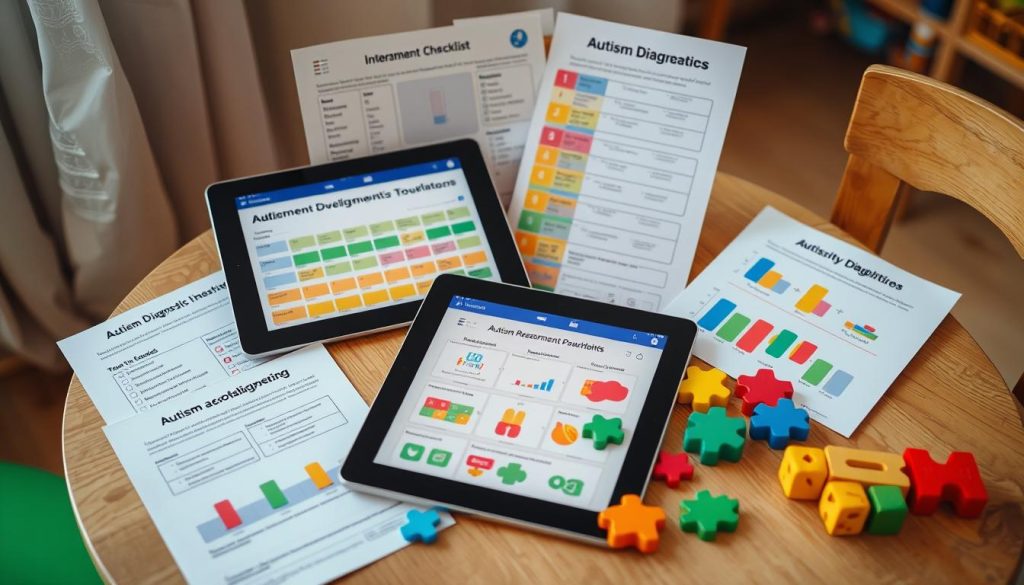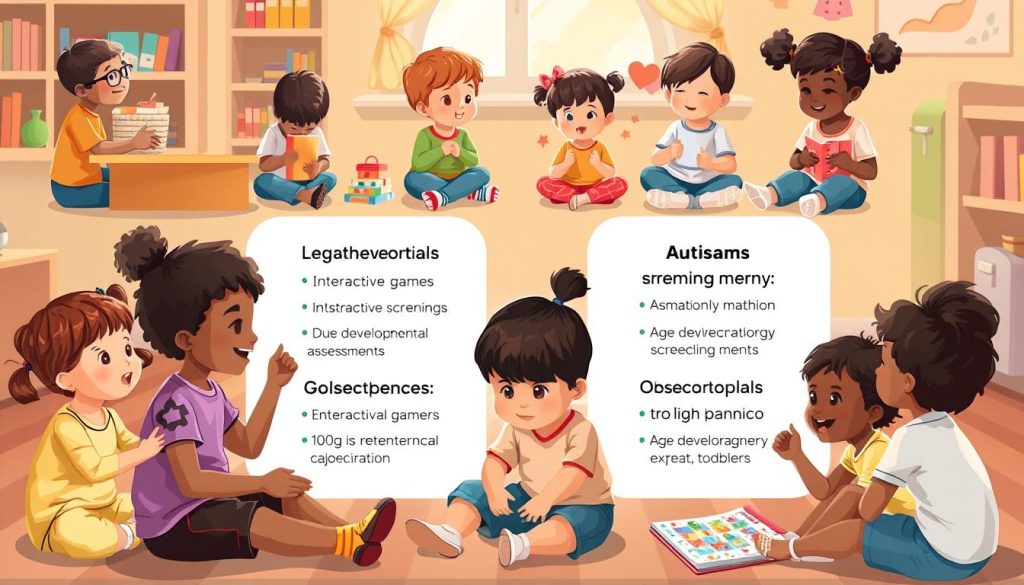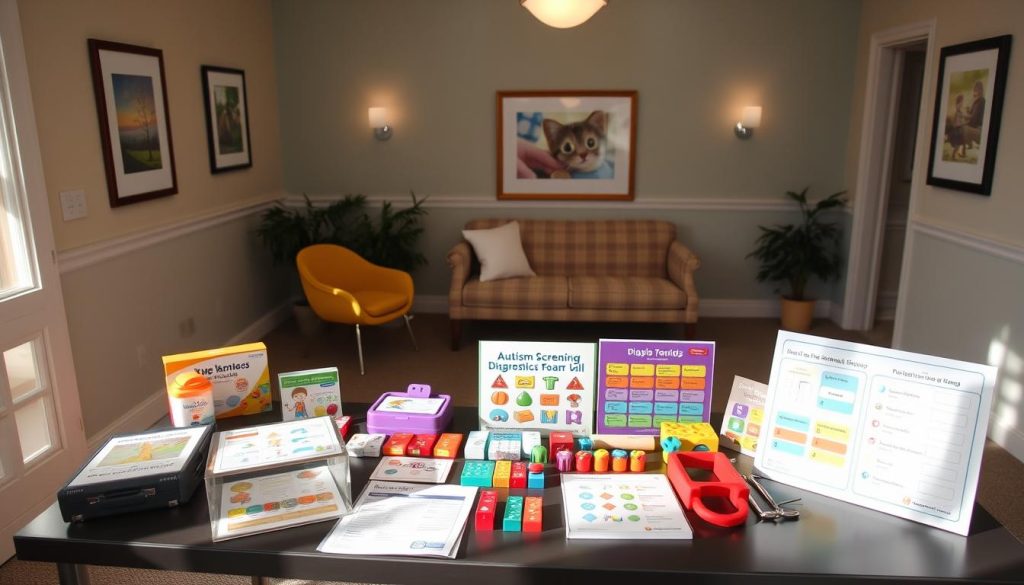Testing for autism spectrum disorder is key in childhood health checks. This guide will show you how to get an autism diagnosis. We’ll look at different tools for diagnosing autism and why finding it early is important.
If you’re a parent seeing signs or a doctor looking for answers, knowing how to diagnose autism is vital. Let’s explore autism testing and the steps you can take to find out.
Understanding Autism Spectrum Disorder (ASD)
Autism spectrum disorder is a complex condition that affects how people interact and communicate. It’s important to spot symptoms early for timely help.
Definition and Core Characteristics
ASD brings challenges in social communication and repetitive behaviors. Each person’s experience is different, making it unique.
The Spectrum Nature of Autism
Autism is a spectrum disorder, impacting people in various ways. Some need a lot of support, while others need less. This shows the need for tailored approaches in diagnosis and treatment.
Impact on Daily Functioning
ASD affects many areas of life, including:
- Social interactions
- Communication skills
- Sensory sensitivities
- Learning abilities
- Daily routines
Knowing these impacts helps in spotting symptoms and supporting individuals. Early action can make a big difference for those with autism.
Early Warning Signs and Red Flags
It’s important to spot the signs of autism in kids early. Parents and caregivers need to know about key milestones and red flags for autism spectrum disorder.

Infants and toddlers with autism might act differently or miss important steps. Look out for these signs:
- Limited eye contact or lack of response to their name
- Delayed speech or regression in language skills
- Repetitive movements or unusual body postures
- Intense focus on specific objects or topics
- Difficulty with changes in routine or environment
Spotting autism early can help with early support. If you see these signs in your child, talk to a pediatrician. Every child grows at their own pace. But, acting early can greatly improve their future.
| Age | Potential Signs of Autism |
|---|---|
| 6-12 months | Limited babbling, lack of gestures like pointing or waving |
| 12-24 months | No single words by 16 months, no two-word phrases by 24 months |
| 24-36 months | Limited pretend play, reduced interest in peers |
Knowing these early signs helps parents get help for their child’s development.
How Do You Test For Autism: Step-by-Step Process
Testing for autism is a detailed process. It uses different methods and techniques. Knowing this can help families understand the diagnostic journey better.
Initial Screening Methods
The first step is often developmental screenings during check-ups. Pediatricians use questionnaires and observations to spot signs of autism. If they find concerns, they might suggest more detailed tests.
Professional Evaluation Stages
If initial screenings show a need for more, families see specialists. These experts use various techniques, including:
- Behavioral observations
- Cognitive assessments
- Speech and language evaluations
- Sensory processing tests
Documentation Requirements
Keeping detailed records is key during testing. This includes:
- Medical history
- Developmental milestones
- School records (if applicable)
- Results from all screenings and evaluations
Good documentation gives a full picture of the child’s development. It helps in making an accurate diagnosis and planning the right interventions.
Types of Autism Diagnostic Tools
Autism diagnostic tools are key in finding and checking Autism Spectrum Disorder (ASD). They help experts get the info they need for correct diagnoses. Let’s look at the main types of tools used in these assessments.

Standardized Assessment Instruments
Standardized tests give the same results for everyone. They check social skills, how well someone talks, and repetitive actions. The Autism Diagnostic Observation Schedule (ADOS) and the Autism Diagnostic Interview-Revised (ADI-R) are well-known tools.
Behavioral Observation Scales
These scales watch and rate behaviors linked to autism. They look at how someone interacts, talks, and what they’re interested in. The Childhood Autism Rating Scale (CARS) is a common tool used in autism checks.
Cognitive Testing Methods
Cognitive tests check thinking and learning skills. They find out what someone is good at and what they struggle with. The Wechsler Intelligence Scale for Children (WISC) is often part of a full autism check.
| Tool Type | Example | Purpose |
|---|---|---|
| Standardized Assessment | ADOS | Evaluate social and communication skills |
| Behavioral Observation | CARS | Rate autism-related behaviors |
| Cognitive Testing | WISC | Assess intellectual abilities |
These tools work together to give a full view of someone’s strengths and challenges. By using different methods, experts can make sure diagnoses are right. This helps in making good treatment plans.
The Role of Healthcare Professionals in Diagnosis
Diagnosing autism needs a team of skilled healthcare professionals. Each expert is vital in the evaluation process. They use different techniques to understand a person’s development fully.
Pediatricians often start the process. They screen children during regular checkups. If they spot signs of autism, they refer families to specialists.
Developmental pediatricians focus on child growth and behavior. They are key in early detection.
Child psychologists and psychiatrists use specific criteria to assess behavior and mental health. They conduct detailed evaluations. They also use tests to measure social skills, communication, and cognitive abilities.
Speech-language pathologists check communication skills, often affected in autism. Occupational therapists look at how daily activities impact a child. They suggest ways to improve.
| Professional | Role in Autism Diagnosis |
|---|---|
| Pediatrician | Initial screening and referrals |
| Developmental Pediatrician | Specialized evaluation of child development |
| Child Psychologist | Behavioral and cognitive assessments |
| Speech-Language Pathologist | Communication skills evaluation |
| Occupational Therapist | Assessment of daily living skills |
Together, these professionals create a detailed profile of a person’s strengths and challenges. This team approach ensures a thorough evaluation. It leads to accurate diagnosis and effective treatment and support.
Age-Specific Assessment Guidelines
Autism screening methods change with a child’s age. This ensures early detection is accurate. Let’s look at how experts assess children at different stages.

Testing for Toddlers (18-36 months)
For toddlers, screenings check social interactions and communication. Tools like the M-CHAT (Modified Checklist for Autism in Toddlers) help spot early signs. They also watch for language, eye contact, and play.
Preschool Age Evaluations
Preschoolers get more detailed checks. These look at social skills, language, and behavior in different settings. The ADOS (Autism Diagnostic Observation Schedule) is used to evaluate communication and play.
School-Age Assessments
For school-age kids, screenings are more in-depth. They include cognitive tests, academic checks, and behavioral observations. Tests assess language, social thinking, and how well a child adapts. Teachers and parents also share their insights.
Early detection of autism is vital for support and help. If you worry about your child, talk to a healthcare expert. They can guide you through the right steps.
Diagnostic Criteria According to DSM-5
The Diagnostic and Statistical Manual of Mental Disorders, Fifth Edition (DSM-5) sets key autism diagnostic criteria. These guidelines help experts identify autism symptoms and make precise diagnoses.
- Persistent deficits in social communication and interaction
- Restricted, repetitive patterns of behavior, interests, or activities
For a diagnosis, individuals must struggle in both areas. Symptoms must appear early in life. They might not show up fully until social demands are too much.
The DSM-5 also has a severity scale. It ranges from Level 1 (needs support) to Level 3 (needs very substantial support). This scale helps figure out the level of support needed.
| Severity Level | Social Communication | Restricted/Repetitive Behaviors |
|---|---|---|
| Level 1 | Noticeable difficulties without support | Inflexibility causes interference |
| Level 2 | Marked deficits even with support | Obvious to casual observer |
| Level 3 | Severe deficits causing impairment | Markedly interfere with functioning |
Knowing these criteria is key for parents, teachers, and healthcare workers. It helps them spot autism signs and get the right evaluations.
Common Screening Tools and Their Applications
Autism screening methods are key in early detection and diagnosis. Let’s look at some widely used tools for identifying autism spectrum disorder signs.

M-CHAT (Modified Checklist for Autism in Toddlers)
The M-CHAT is a screening tool for toddlers aged 16 to 30 months. It has 20 yes/no questions about a child’s behavior. Parents can fill it out in about 5 minutes, making it a quick screening.
ADOS (Autism Diagnostic Observation Schedule)
ADOS is a tool for assessing communication, social interaction, and play in suspected autism cases. It involves direct observation by experts and takes 30 to 60 minutes. It’s known for its reliability in autism diagnosis.
ADI-R (Autism Diagnostic Interview-Revised)
The ADI-R is a structured interview with parents or caregivers of suspected autism cases. It covers developmental history and current behavior. It takes 1 to 2 hours and offers deep insights into a person’s development.
These tools together give a full picture of an individual’s behavior and development. By combining them, healthcare professionals can make more accurate diagnoses and create effective intervention plans.
The Importance of Early Detection
Spotting autism early can change a child’s life. Finding signs of autism early means kids can get help fast. Parents and caregivers are key in noticing these signs.
Early detection leads to special therapies and programs for kids. These help with talking, social skills, and growing. Getting help early boosts a child’s chances to reach their goals.
Some key benefits of early autism detection include:
- Improved language and communication skills
- Enhanced social interactions
- Better academic performance
- Increased independence in daily activities
- Reduced challenging behaviors
Early help also helps families understand their child’s needs. It teaches them how to support their child’s growth. By spotting autism early, parents can create a supportive environment for their child.
Every child grows at their own pace. But if you see something that worries you, talk to your pediatrician. Early detection can lead to a brighter future for kids with autism.
Preparing for an Autism Assessment
Getting ready for an autism assessment can feel overwhelming. By understanding autism evaluation techniques and following autism assessment guidelines, you can make the process smoother. Let’s break down what you need to know to prepare effectively.
Required Documentation
Gather all relevant records before your appointment. This includes medical history, school reports, and any previous evaluations. Also, bring a list of your child’s behaviors, strengths, and challenges. These documents help professionals get a complete picture of your child’s development.
What to Expect During Testing
Autism assessments typically involve several steps. Your child may complete tasks, answer questions, and play with toys while professionals observe. Parents often fill out questionnaires about their child’s behavior. The evaluation can take a few hours or multiple sessions, depending on the child’s needs.

Parent’s Role in the Process
Parents play a critical role in autism evaluations. You know your child best, so your input is invaluable. Be ready to answer questions about your child’s development, behaviors, and daily life. Stay involved throughout the assessment process and don’t hesitate to ask questions.
| Assessment Stage | Parent’s Role |
|---|---|
| Pre-Assessment | Gather documents, observe behaviors |
| During Assessment | Provide information, support child |
| Post-Assessment | Discuss results, plan next steps |
Remember, autism assessments aim to understand your child’s unique needs. By preparing thoroughly and staying engaged, you contribute to a more accurate evaluation and better support for your child.
Understanding Test Results and Next Steps
After finishing autism evaluations, families often find it hard to understand the results and what to do next. The autism diagnostic criteria are key in making sense of these outcomes. Doctors use special tools to check behaviors and skills against typical developmental milestones.
- Autism Spectrum Disorder (ASD) diagnosis
- No ASD diagnosis, but other developmental concerns
- No significant developmental issues identified
If a child is diagnosed with ASD, the team will share detailed info about their strengths and challenges. This helps in spotting autism symptoms and making a plan for help.
For families who get an ASD diagnosis, here are some next steps:
- Look into therapy options (speech, occupational, behavioral)
- Find support groups and resources
- Talk about school accommodations
- Plan for long-term care and support
Early intervention is very important. Starting therapies and supports early can greatly improve a child’s life. Families should work with their doctors to make a care plan that fits their child’s needs.
| Diagnosis | Recommended Next Steps |
|---|---|
| ASD Confirmed | Begin early intervention, explore therapy options, connect with support groups |
| Other Developmental Concerns | Further evaluation, targeted interventions based on specific challenges |
| No Significant Issues | Continue regular developmental monitoring, address any emerging concerns |
Insurance Coverage and Cost Considerations
Finding out how much autism testing costs can be tough for families. Many private insurance plans now cover autism tests and assessments. It’s important to check with your insurance about what they cover and any costs you might have to pay.
Government Support Programs
If you don’t have private insurance or need more help, government programs can help. Medicaid often covers autism services, including tests. Some states have autism-specific waivers that offer extra support for testing and treatment.
Finding Alternative Funding
If insurance and government programs don’t cover everything, there are other ways to get help. Local autism groups, charities, and crowdfunding sites might offer financial aid. Some hospitals and clinics also have payment plans or sliding scale fees to help families afford tests.
FAQ
Q: What are the early signs of autism in children?
A: Early signs of autism in children include limited eye contact and delayed speech. They also show repetitive behaviors and have trouble with social interactions. Sensitivity to sensory stimuli is another sign. Remember, symptoms can vary a lot between kids.
Q: At what age can autism be diagnosed?
A: Autism can be diagnosed as early as 18 months. But, many kids are diagnosed later. Early signs can be seen between 12-18 months. A firm diagnosis usually comes by age 2.
Q: What is the M-CHAT screening tool?
A: The M-CHAT is a tool for checking autism risk in kids aged 16 to 30 months. It’s a questionnaire for parents or caregivers. It helps spot kids who might need a deeper check.
Q: How long does an autism evaluation typically take?
A: An autism evaluation can take weeks or months. It includes many sessions. These might include interviews, observations, and tests. The total time can be 2 to 6 hours.
Q: Who is involved in the autism diagnostic process?
A: A team of experts works together for the diagnosis. This team might include psychologists, speech therapists, and pediatricians. Each brings their own skills for a full evaluation.
Q: What is the ADOS test?
A: The ADOS is a tool for diagnosing autism. It checks communication, social skills, and play. A trained professional observes a series of tasks during the test.
Q: How accurate are autism diagnostic tests?
A: Tests are very accurate when done by experts. But, no test is 100% sure. A mix of methods gives the best results.
Q: Can adults be tested for autism?
A: Yes, adults can get tested for autism. Some get diagnosed as adults. Tests for adults include a detailed history and observing their behavior and social skills.
Q: How can I prepare my child for an autism assessment?
A: Make sure your child is rested and comfortable. Bring their favorite things and any important records. Write down your concerns and observations about their development.
Q: What happens after an autism diagnosis?
A: After a diagnosis, you’ll work on a plan for your child. This might include therapy and educational support. Your doctor will talk about options and help find resources and services.


















